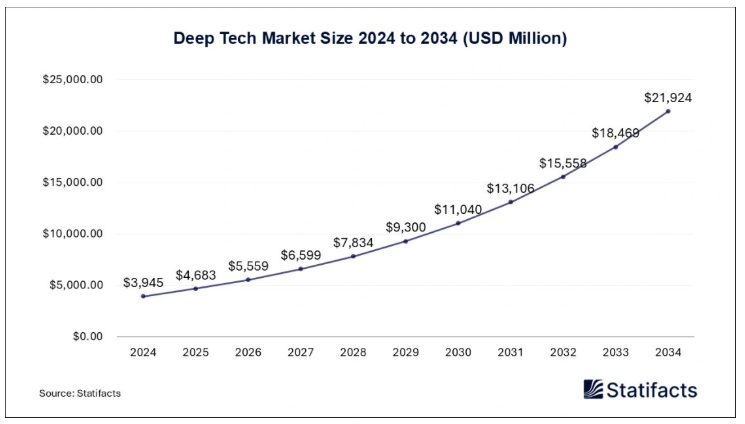The Deep Tech industry is at the forefront of technological transformation, revolutionizing multiple sectors with cutting-edge innovations. The global deep tech market, valued at USD 3,945 million in 2024, is poised for remarkable expansion, projected to reach USD 21,924 million by 2034. This impressive growth, marked by a compound annual growth rate (CAGR) of 18.71%, highlights the increasing adoption of deep tech solutions across industries, driven by advancements in artificial intelligence (AI), quantum computing, robotics, and biotechnology.

Understanding Deep Tech and Its Impact
Deep tech refers to innovations based on scientific and engineering breakthroughs, often involving artificial intelligence, machine learning, blockchain, nanotechnology, robotics, and quantum computing. Unlike conventional software-based startups, deep tech companies focus on solving complex global challenges with high-impact technologies.
The deep tech ecosystem is flourishing due to increasing investments, academic research collaborations, and government initiatives aimed at fostering technological development. Companies in this space prioritize long-term research and development (R&D), creating solutions with transformative potential across various industries.
Key Market Drivers and Growth Enablers
Several factors contribute to the rapid expansion of the deep tech market:
- Rising Demand for AI and Machine Learning: AI-powered solutions are disrupting industries such as healthcare, finance, and manufacturing, leading to more efficient processes and data-driven decision-making.
- Breakthroughs in Quantum Computing: Quantum technology is set to revolutionize cryptography, material science, and complex problem-solving, attracting significant funding from tech giants and governments worldwide.
- Advancements in Biotechnology and Healthcare: From personalized medicine to gene editing, deep tech is playing a crucial role in healthcare innovations, improving diagnostics and treatment methodologies.
- Increased Government and Venture Capital Investments: Governments and private investors are allocating substantial resources to deep tech startups, fostering an environment for innovation and commercialization.
- Sustainability and Climate-Tech Innovations: Deep tech is driving solutions for climate change, renewable energy, and sustainable agriculture, addressing pressing global environmental concerns.
Regional Market Insights
The North American market leads in deep tech innovation, fueled by strong research institutions, government funding, and major tech companies. Europe is also witnessing significant growth, with the European Commission investing heavily in AI, robotics, and blockchain technologies. Meanwhile, Asia-Pacific is emerging as a key player, particularly in countries like China, Japan, and India, where deep tech adoption is accelerating due to rapid industrialization and digital transformation.
Challenges and Future Outlook
Despite its immense potential, the deep tech market faces several challenges:
- High R&D Costs: Developing deep tech solutions requires substantial investment, often resulting in long development cycles.
- Regulatory Hurdles: As deep tech innovations advance, governments must create regulatory frameworks that ensure ethical and secure deployment of these technologies.
- Talent Shortage: The industry demands highly skilled professionals with expertise in AI, quantum computing, and biotechnology, creating a talent gap that needs to be addressed through education and training initiatives.
However, the future of deep tech remains bright. With continuous innovation, strategic investments, and cross-industry collaborations, deep tech will continue to reshape the global economy, unlocking new opportunities for businesses and societies alike. The projected 18.71% CAGR underscores the vast potential this industry holds, making it a key driver of the next technological revolution.

















